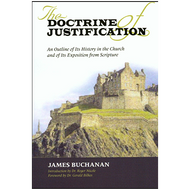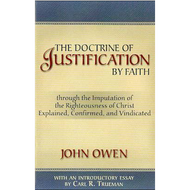Categories
Categories
The Future of Justification by John Piper (Paperback)
Product Description
About the Author
John Piper (DTheol, University of Munich) is the founder and teacher of desiringGod.org and the chancellor of Bethlehem College & Seminary. He served for 33 years as the senior pastor of Bethlehem Baptist Church in Minneapolis, Minnesota, and is the author of more than 50 books, including Desiring God, Don’t Waste Your Life, This Momentary Marriage, Bloodlines, and Does God Desire All to Be Saved?
Publisher's Description
N. T. Wright, a world-renowned New Testament scholar and bishop of Durham in the Church of England, has spent years studying the Apostle Paul's writings and has offered a "fresh perspective" on Paul's theology. Among his conclusions are that "the discussions of justification in much of the history of the church—certainly since Augustine—got off on the wrong foot, at least in terms of understanding Paul—and they have stayed there ever since." Wright's confidence that the church has gotten it wrong for 1,500 years, given his enormous influence, has set off warning bells for Christian leaders such as John Piper, a pastor and New Testament scholar. If Wright's framework for interpreting the New Testament text and his understanding of justification find a home in the church, not only could the doctrine of justification be distorted for generations to come, but the New Testament writers' original intent could be silenced. So Piper is sounding a crucial warning in this book, reminding all Christians to exercise great caution regarding "fresh" interpretations of the Bible and to hold fast to the biblical view of justification.
Endorsement
Granted I am writing this after a quick and sometimes headache inducing read of this book, but I will try to get to the heart of the issue as concisely as possible. Piper fears that theologian N.T. Wright is promoting a view of salvation that is both overly complicated and misrepresents God's ordained way of saving people from their sin. Wright defines "saved" as "being a member of God's true family", that is to say, a recipient of the promise made to Abraham in Genesis 15, a family with no necessary blood relation or ethnic borders but defined by faith in Christ. All other benefits flow out of this reality.
Piper appreciates that this view of salvation seems fashionable and different from the traditional view which focuses on Christ dying on the cross to pay for the sin of humanity. He also believes it can be complicated and risks misleading the amateur theologian.
While Piper's concern is plausible, we should not mistake the simple for the accurate. Wright answers most of Piper's concerns in his book Justification (in particular, the exegetical chapter on Galatians) and asserts that we must take the writings of Paul in their own context, not contexts that make things "easier to understand by ordinary folk" as Piper puts it. In any case, the following may help summarize the arguments that Piper fills out at greater length through the book.
Piper's view of justification:
1) A person responds to God's call to faith through baptism.
2) The person then has Christ's moral perfection imputed to them IN FULL.
3) On the BASIS of that fully imputed moral perfection, the person is declared justified.
4) Because of this, the person increases in Spirit-generated good works and ultimately shares Christ's resurrection. In other words, we all POSSESS moral perfection upon belief and baptism, but it manifests in our lives little by little.
Wright's view (to which Piper objects):
1) A person responds to God's call to faith through baptism, showing them to be a member of God's true family, the true descendants of Abraham.
2) The person is now LEGALLY absolved of all unrighteousness, and destined for future glorification.
3) The Spirit begins manifesting in the form of good works in the person's life, and ULTIMATELY shares Christ's resurrection and moral perfection.
4) The BASIS of justification is this entire COMPREHENSIVE process, steps one through three. In other words, moral perfection is not imputed all at once, nor do we possess it all at once, but it is developed over time through the work of the Holy Spirit.
Is Piper easier to understand? Yes. But he is also motivated to defend the interpretation of his tradition, and Wright does better in exegesis.
Piper's objection seems to be: How can a person be declared innocent by God without in fact having actual moral perfection "imputed" to them? Wouldn't God be creating a legal fiction?
Wright's response seems to be: It is no fiction. God makes his declaration based on what he sees as moral perfection being made complete IN THE FUTURE. We mortals can only make declarations based on what we see in the here and now. God can see what will be.
 Loading... Please wait...
Loading... Please wait... 









